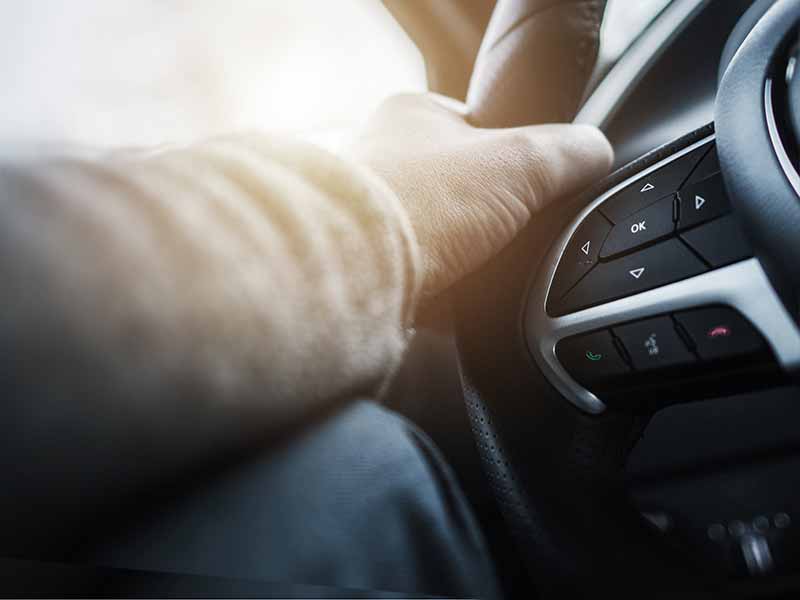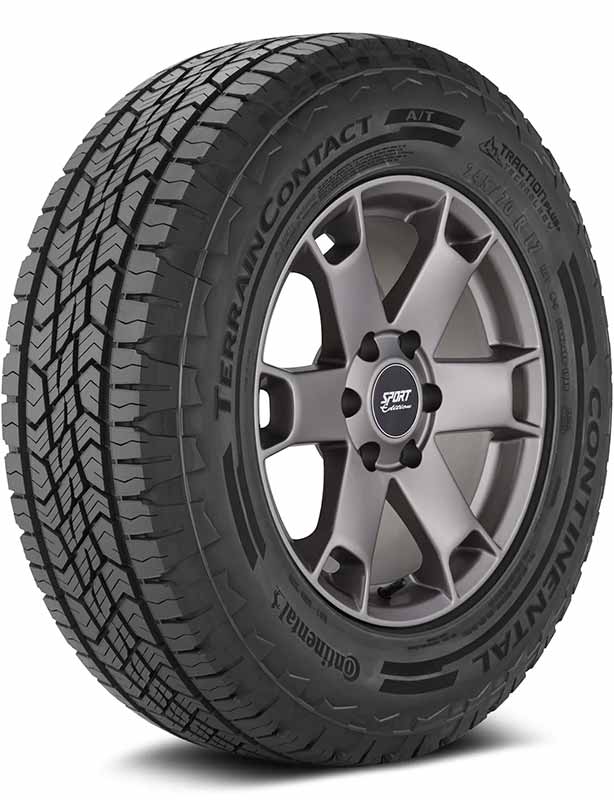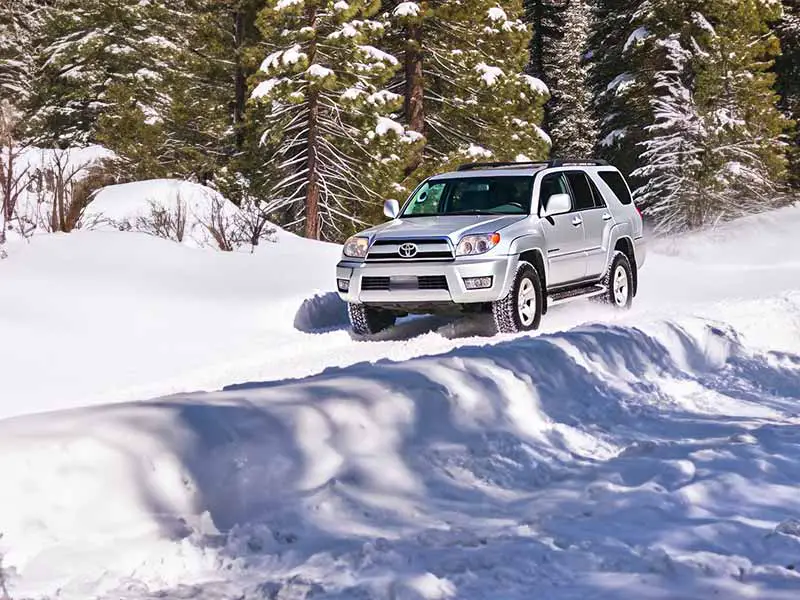Tire noise diagnosis is the first step reduce tire noise. Noisy tires can be due to several reasons. It’s even possible the loud tire noises you think you hear, aren’t actually from your tires.
How To Quiet Noisy Tires
To reduce tire noise you should check the air pressure, have your tires rotated, and ensure the wheels are aligned properly. Well-maintained tires will produce less noise.
Alternatively, you can replace them with tires designed to be more quiet. The quietest tires contain sound deadening foam and tuned tread patterns produce a quieter ride.
You could simply replace your tires with some quieter tires such as the ones from Continental with ContiSilent technology. Or install sound-deadening mats in the car doors and floorboard for a more quiet ride.
But this may not be addressing the root problem. While some tires are naturally louder, there are many issues that can cause even quieter tires to become loud.
Let’s take a closer look.
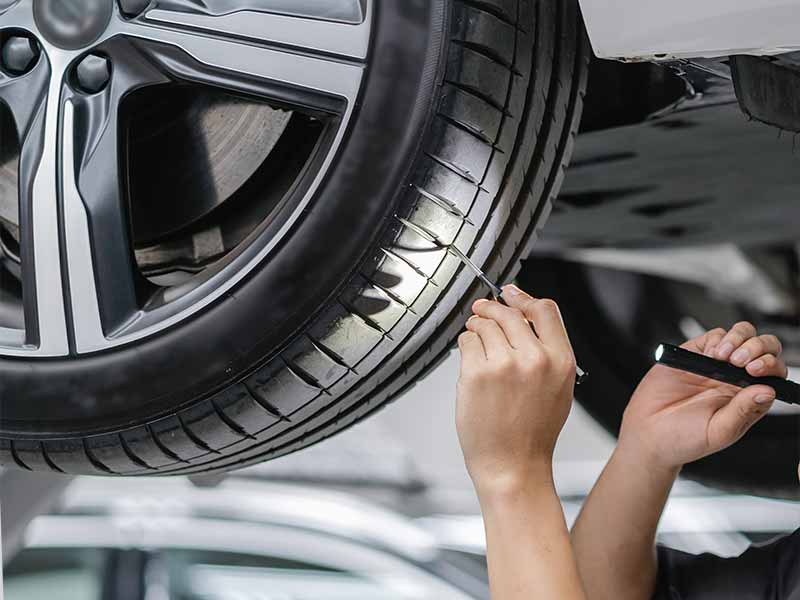
Tire Squealing
It’s common for tires to squeal a bit when braking aggressively, accelerating quickly from a stop, or taking a turn too fast, but when the squealing continues as you drive you should look for a cause
Improperly Inflated Tires
Tires that are not properly inflated do not come into contact with the road surface correctly. Because of this, they can make a squealing noise in some circumstances.
Underinflated tires will cause the tire to put more pressure on the inner and outer edges of the tread pattern. This will cause the tread to wear on the shoulders of the tire and can cause the sidewalls to flex significantly which can do serious damage to the tire itself as well as create a squealing noise from tires when turning or even driving in a straight line.
Overinflated tires will cause the tires to ride on the center of the tread pattern and the edges will not have much pressure against the pavement. This will cause the center of the tread to wear more rapidly and significantly reduce traction since much of the tire isn’t gripping the road. This will make it much easier for the tire to slide and squeal when turning.
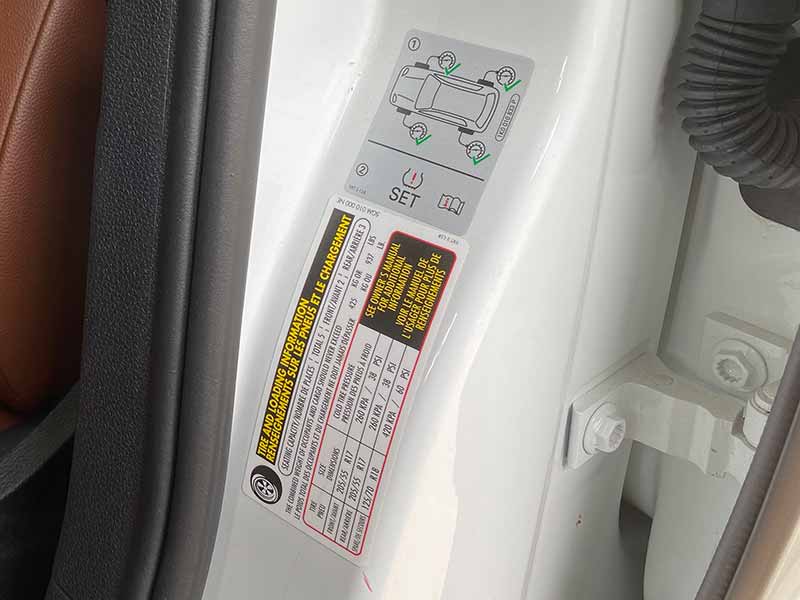
Poor Wheel Alignment
Proper alignment is important for your tires to contact the road properly. Incorrect camber and toe alignment can cause your tires to slightly slide or drag as it travels down the road and can increase squealing when turning.
Misalignment can also lead to uneven wear which can also cause excessive tire noise.
Other Sources Of Squealing
It’s possible that squealing could be coming from places other than your tires. Squealing noises are more often from worn accessory belts, power steering pumps low on hydraulic fluid, squeal strips for indicating brake pads need replacing, and even worn suspension components in some instances.
Tire Humming
Many things on a car or truck can hum, but the tires shouldn’t be one of them. Road noise from tires can produce a soft roar but it shouldn’t be a hum. Humming is more of a high-speed rhythmic sound.
Unevenly Worn Tires
Probably the most common cause of humming noise from tires is uneven wear patterns. There are many types of uneven tire wear, but the bulk of these problems are caused by underinflated tires, unbalanced tires, or alignment problems.
If the surface of your tire tread blocks isn’t consistent from sidewall to sidewall and around the circumference of the tire, the inconsistencies can produce a humming sound.
To reduce tire noise you should be sure to practice good tire maintenance to help ensure your tires wear evenly and keep road noise to a minimum.
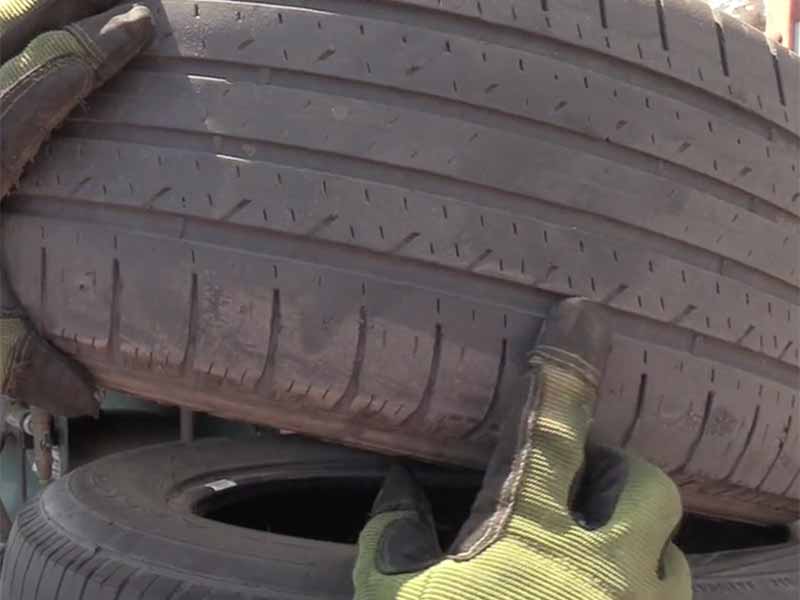
Tire Rotation
One of the more important tire maintenance tasks to get the most life out of your tires is rotating them every 5,000 miles or so. By rotating your tires around to the different positions around your vehicle they will experience the unique wear patterns of each corner of your car or truck. This will help maximize their life and even out wear problems over time.
Wheel Alignment
Having your wheels and tires aligned every 10,000 miles will help correct alignment problems that are caused by potholes and curb strikes over time. These hard hits and strikes can nudge alignment out of spec and even bend suspension components.
Also, worn suspension components can make it difficult for your suspension to maintain proper alignment settings. Having an alignment performed regularly will help these issues get identified before too much uneven wear occurs to your tires and will help reduce noise.
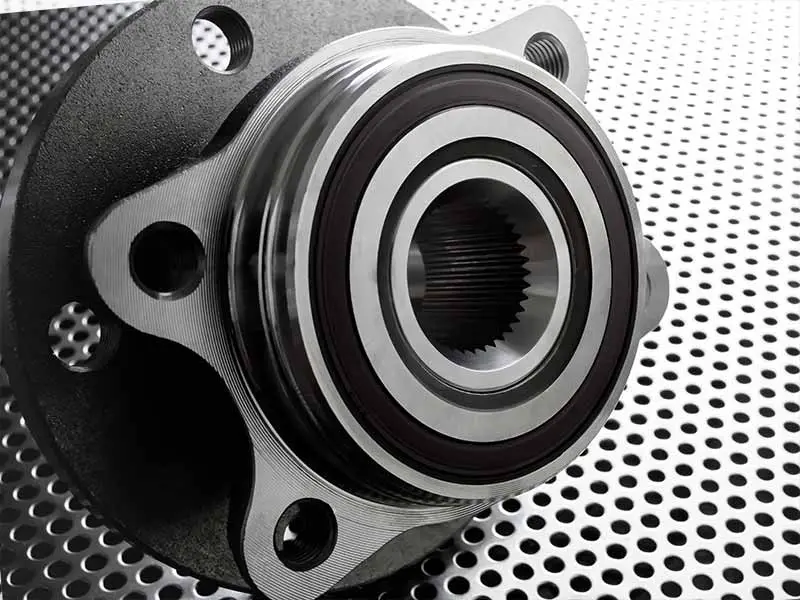
Wheel Bearings
Wheel bearings are the main bearings your wheels and tires spin on. Eventually, they begin to fail and can create a humming noise coming from the area of the tires. You may actually have quiet tires but a noisy wheel bearing.
Wheel bearing failure is a serious issue and should be inspected by a mechanic if you suspect the humming sound you’re hearing is a failing bearing.
Womp Womp Tire Noise
A “Womp Womp” noise or helicopter-like noise coming from your tires is a common problem that will appear suddenly. It’s usually due to some sort of damage that has occurred.
Sometimes you will be able to identify when and where the damage happened, and other times you won’t recall an event that could have caused some damage but you will notice the sudden new noise coming from your tires as they spin.
These types of noisy tires will change the frequency with the speed of your car or truck. This is a telltale sign the issue is with your tires or wheels.
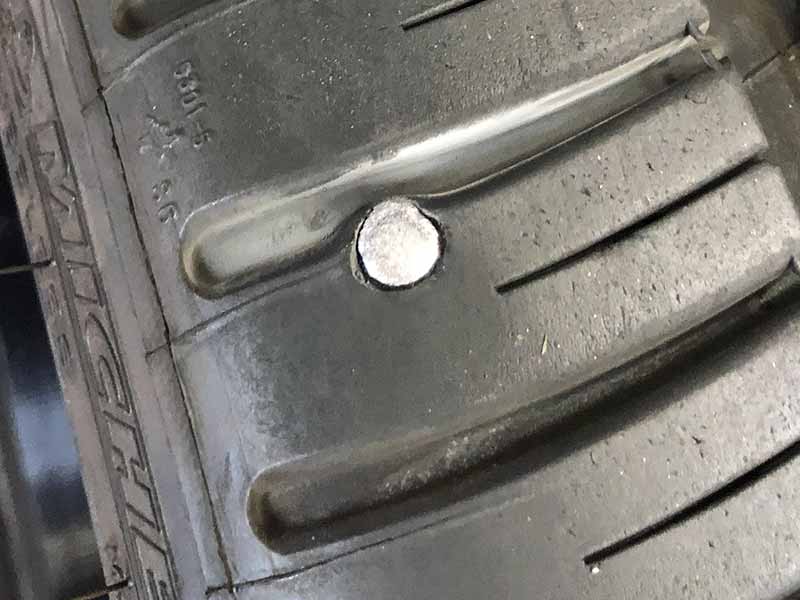
Foreign Object In Tire
Punctured tires will often make a rhythmic sound as the tire spins due to the object still being embedded in the tire tread. Each time that point of the tire tread comes into contact with the pavement it will make a sound.
Nails, screws, pieces of metal, and various sharp objects can all get stuck into your tire and create extra noise and not immediately cause your tire to lose air. Often these objects will get sealed fairly well as they penetrate through the tire. But usually, air will leak out slowly over time.
It’s also common for foreign objects to get wedged between the tread blocks. Stones are a very common source of noise when they are larger in size.
Most typical passenger cars and small trucks and SUVs will have smaller tread grooves that won’t pick up larger stones and rocks that will make significant noise.
Larger trucks and SUVs may have more aggressive tread patterns that have larger gaps between the tread blocks, such as off-road tires, that can pick up larger rocks and create a lot more noise.
Sidewall Bulge Or Belt Damage
Damaged tires due to potholes and curb strikes can cause the tire to break belts or cords inside the tire body that cause it to lose its perfectly round shape and create a rhythmic womping sound.
Sometimes this damage is easily seen as a bulge in the sidewall. Other times it may be not as noticeable.
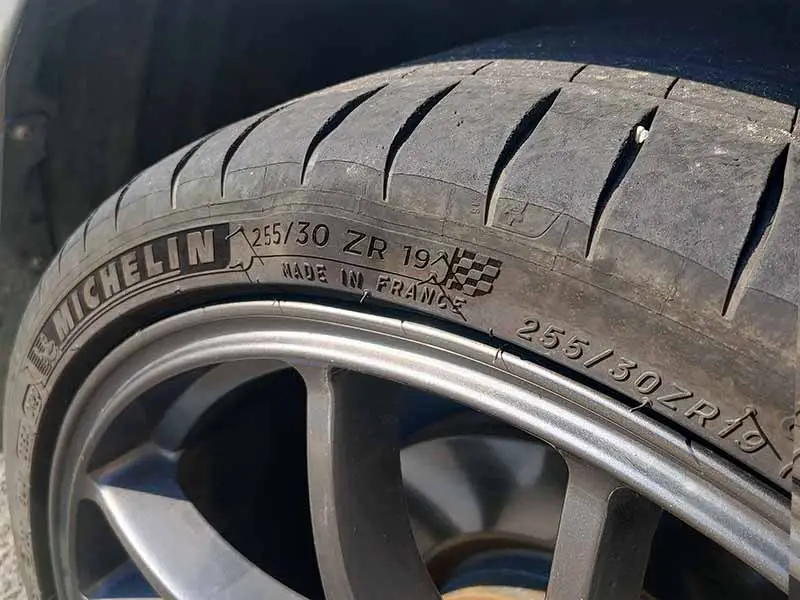
Bent Wheel
Curbs and potholes can bend a wheel if hit at a high enough speed. The tire itself may have come away without any damage, but the wheel may have taken the brunt of the impact and caused a slight bend.
If your wheel has come out of round from an impact it can easily cause more noise even if you have quiet tires that are in good shape.
Replacing a wheel can be inexpensive, but you might consider having your wheel repaired. Bent wheels can usually be straightened. Unfortunately, the bent area will be weaker and more easily bent in the future.
Tire Balance
Out-of-balance wheels and tires will cause the tire to bounce slightly as the tire rolls down the road. This bouncing, if significant enough, can sometimes produce a noticeable womp womp sound.
It’s a good idea to rebalance your tires every 10,000 miles. Your tires will lose balance as they wear down and you may also have slightly damaged wheels that may not need repairing but require a little extra wheel weight in some areas to smooth out the ride.
Suspension Component Wear Or Damage
While less likely to be the cause of this type of road noise, suspension components that are worn or damaged can create various types of sounds.
Worn shocks can be a source of tire bouncing and causing a rhythmic womping sound. If the shocks can’t properly absorb impacts the spring will do what a spring does best and bounce.
Resources
Below are some links you may find helpful when learning about tires
Final Thoughts
In the end, even the best quiet tires can create a lot of road noise if they aren’t properly maintained. Unevenly worn tread blocks due to improperly inflated tires or poor alignment are common. Impact damage to wheels and tires can also be a big source of increased road noise.
If you are sensitive to road noise or have unusually loud tire noise, staying on top of air pressures, alignment, balance, and rotation should keep your tires from not only producing excessive road noise but also last longer.
Good luck and happy motoring.
